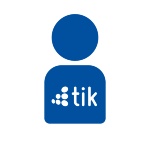New software developments and their potential adoption for e-learning are trialled in the Application Lab. The challenges here are that software applications at a large university must be scalable, especially in areas where large amounts of data are potentially involved, such as AI, or in areas where loads and user numbers are difficult to estimate, such as in collaborative tools.
Two collaborative tools and the necessary infrastructure were tested and developed in the App Lab:
- Jupyter hubs and
- Matrix as a secure chat service and
- a Kuberentes infrastructure.
Jupyter-Hubs
In order to test whether/how an application lab can be implemented with our infrastructure, we decided to commission a Jupyterhub instance in an initial test and thus also create infrastructure for future systems in this direction.
After an initial test on a simple Docker installation, we came to the conclusion that we first need to create new systems in the infrastructure due to the required higher scalability. The focus here is on virtualisation in particular. Modern applications usually work with Docker or Kubernetes. If high scalability is required, Kubernetes is essential.
The following goals have been achieved so far:
- Small Jupyterhub instance based on Docker (not suitable for widespread use in teaching but active as a test system and already used by individual courses as a beta tester; https://jupyterhub.tik.uni-stuttgart.de)
- New: The "bwJupyter for teaching" project is now being funded by the MWK BW as a dialogue process implementation concept in the area of teaching and is being driven forward under the leadership of the KIT. The digit@L project is therefore focussing on other software applications.
Matrix
A matrix installation based on Docker is still in test mode. The transfer to productive operation is already planned and is currently being implemented.
Matrix is an open network for secure, decentralised communication that was developed in 2014. It is based on HTTP and WebRTC to enable messaging and voice calls and works with a decentralised model that can be used with any compatible client. This means that users can switch between different apps without sacrificing the core benefits of the standard. Matrix supports end-to-end encryption and provides APIs for web, iOS and Android, allowing access to Matrix-based clients on all platforms.
Matrix is designed to provide a high-performance and flexible communication platform suitable for a wide range of applications, from individual communication to large, encrypted group chats.
Kuberentes-Infrastructure
The implementation of the Kuberentes infrastructure is progressing and is currently being tested for its scalability.
Contact

Sannah König
Dipl.-Ing.Media didactics




